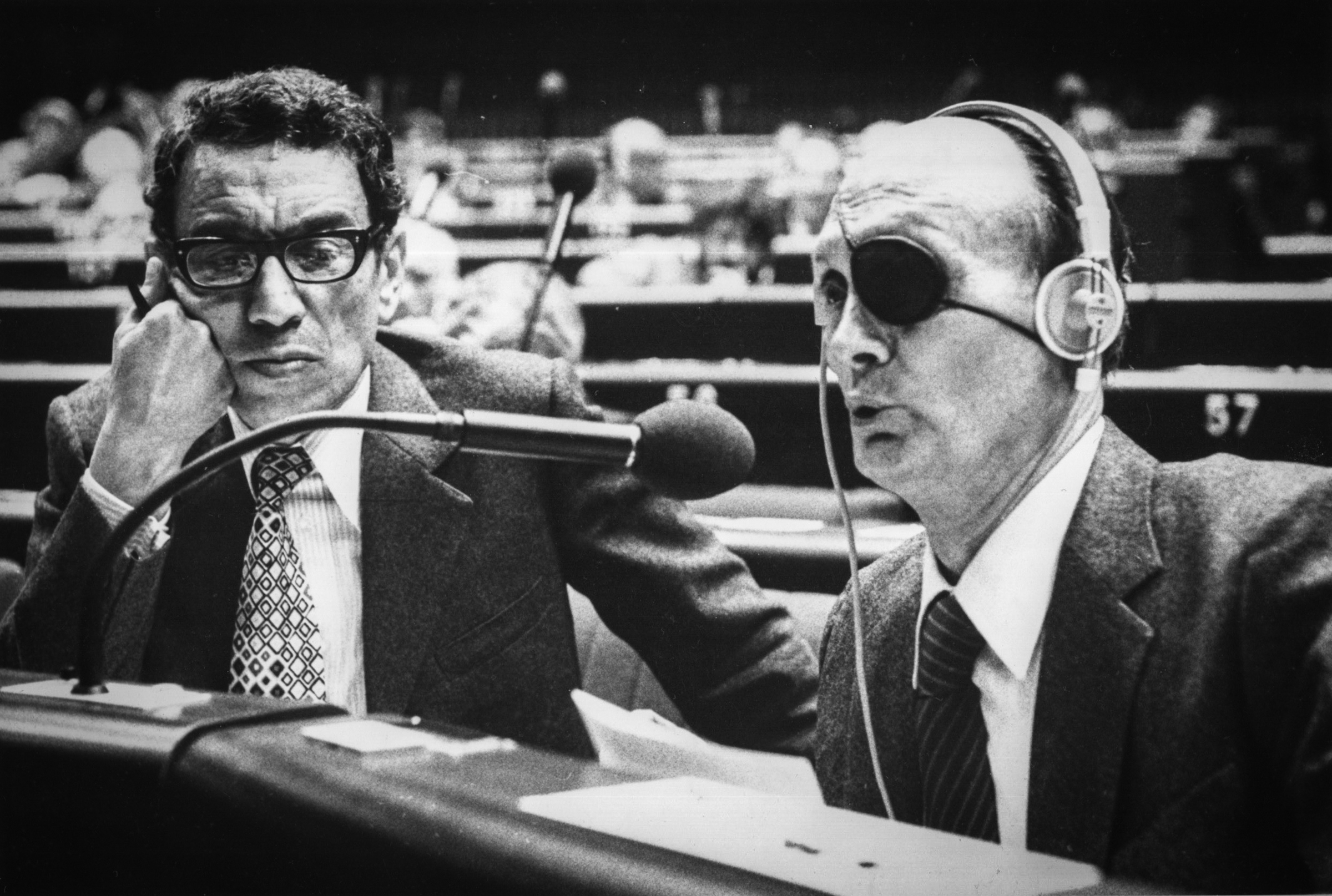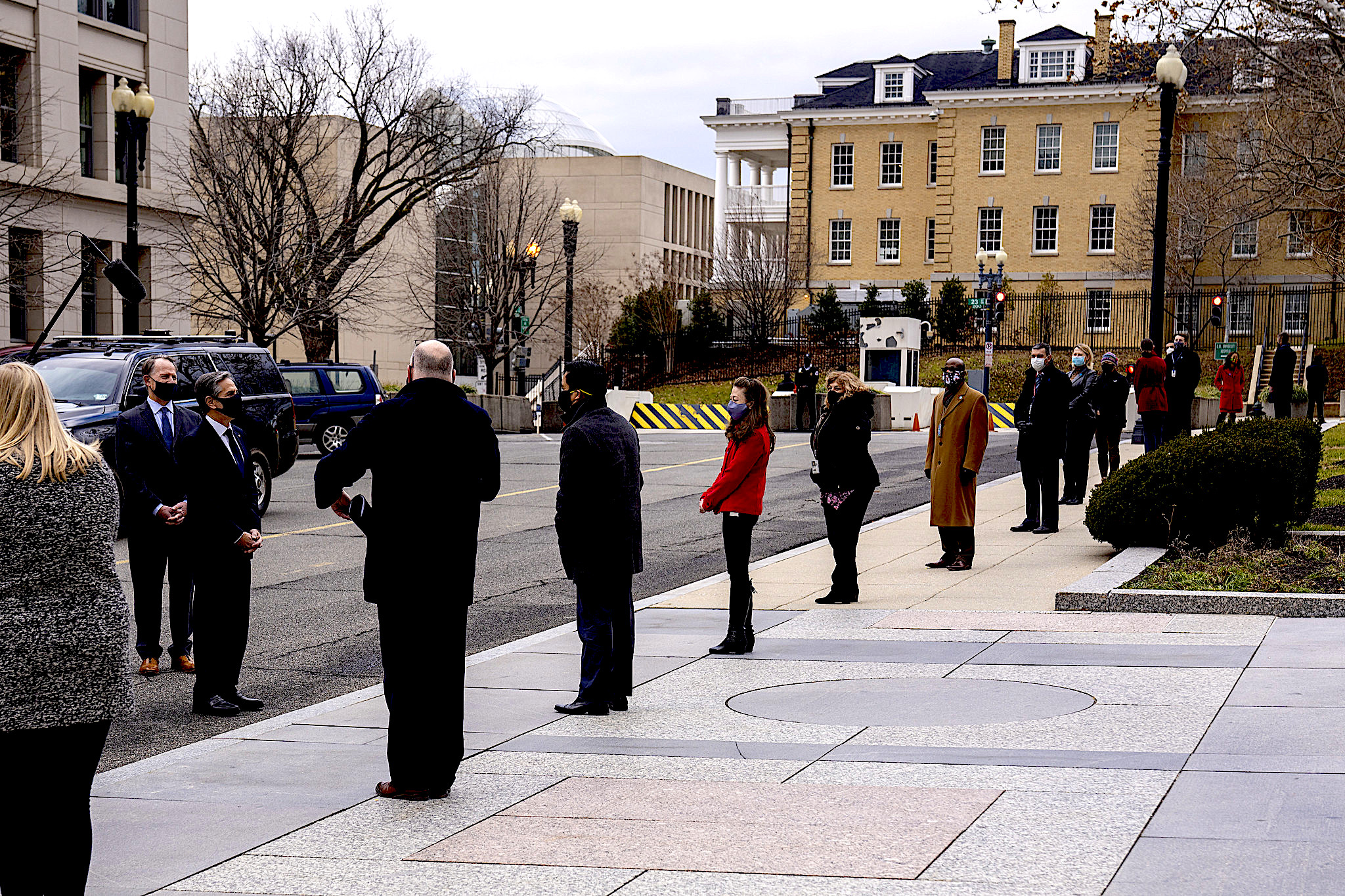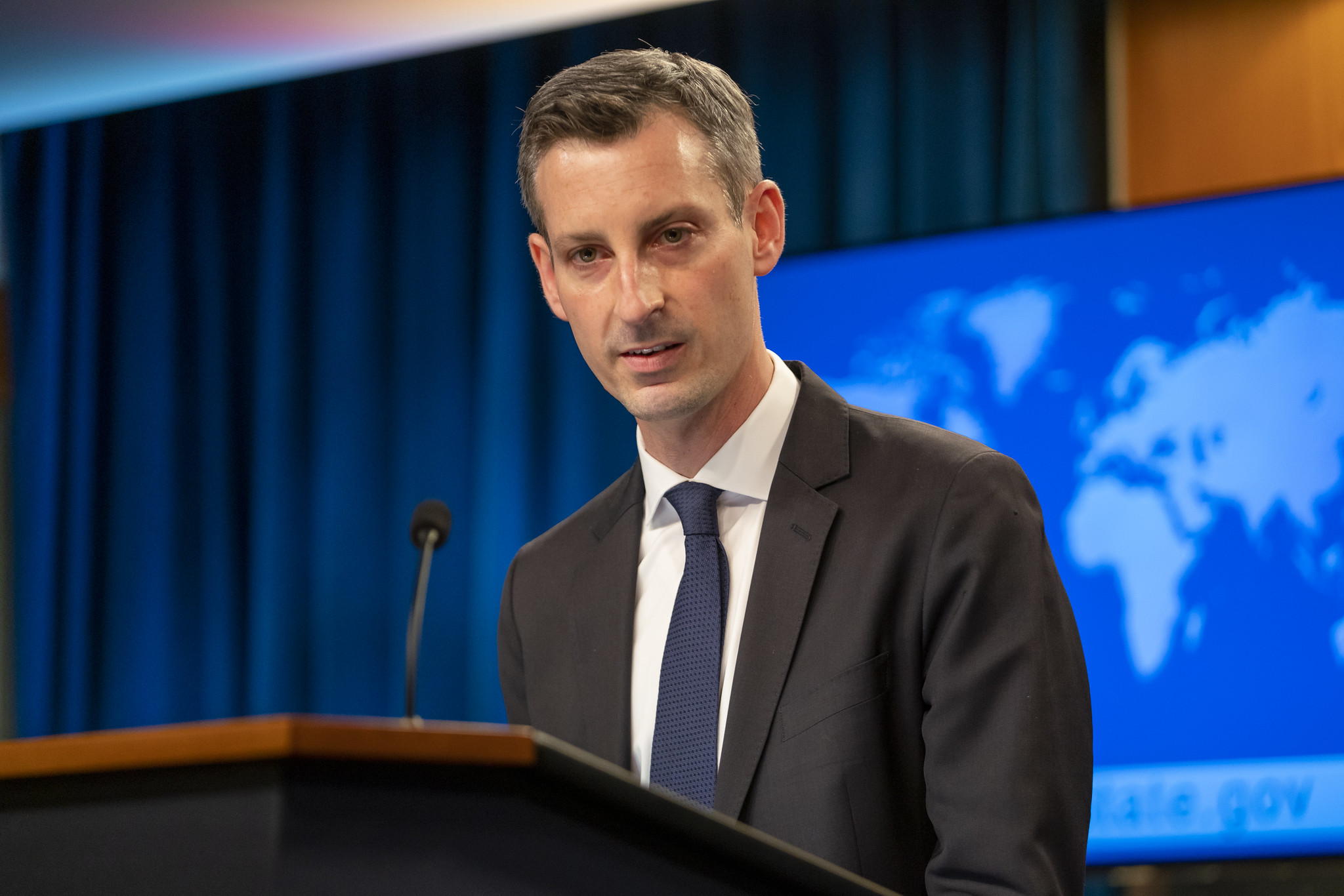We now watch as Biden and his foreign policy people effectively allow Israel to dictate the conditions under which the president can fulfill his campaign promise on Iran.
By Patrick Lawrence
Special to Consortium News
 A return to diplomacy: Let us hold this thought up to the light. Among all the promises President Joe Biden is going to break over the next four years, this will prove the most fraudulent and, in the larger scheme of things, the most consequential of his breaches.
A return to diplomacy: Let us hold this thought up to the light. Among all the promises President Joe Biden is going to break over the next four years, this will prove the most fraudulent and, in the larger scheme of things, the most consequential of his breaches.
As of last week, it is the crisis over the agreement governing Iran’s nuclear programs that stands to demonstrate the truth of this judgment. On Sunday Tehran appeared to put the Biden administration on notice that it has two weeks to get serious about reentering diplomatic negotiations, after which time the shutter will come down on the window of opportunity. As I have previously made clear in this space, I see no evidence that Biden’s national-security people will prove either serious or wise as they address this critical question.
In truth, there is very little American diplomacy to return to. The late and estimable Boutros Boutros–Ghali explained this memorably in Unvanquished, the memoir he published in 1999, after the U.S. forced him out as the UN’s secretary-general because he was not sufficiently obsequious. “Only the weak rely on diplomacy,” the celebrated Egyptian wrote. “The United States sees little need of it, for power is enough.”
How very on the mark. “The Roman Empire had no need of diplomacy,” the learned Boutros–Ghali elaborated. “Nor does the United States: Diplomacy is perceived by an imperial power as a waste of time and prestige and a sign of weakness.”
This is the tradition the Biden administration will return to. Let us call it the diplomacy of no diplomacy.

Boutros Boutros-Ghali, left, and Israel’s Moshe Dayan at the Council of Europe in Strasbourg, October 1979. (Claude Truong-Ngoc, Wikimedia Commons, CC BY-SA 3.0)
There is much talk now of demilitarizing American foreign policy, and it is a fine thing that it is at last permissible to raise the topic in polite conversation. “Time and time again, we’ve seen how over-reliance on military tools can lead us into policy quicksand,” William Burns, a career diplomat and now named CIA director, said in an interview last spring with The Foreign Service Journal. “Time and time again, we’ve fallen into the trap of overusing — or prematurely using — force. That tends to make diplomacy a distorted and under-resourced afterthought.”
The right thoughts, surely. But I urge those assuming Burns’ remarks have anything to do with the new administration’s direction to temper their expectations. It is policy to say such things; it is not how the Biden administration intends to conduct policy.
Iran as Early Indicator
The Iran question was fated to stand as an early indicator of President Biden’s foreign policy principles (if this is my word). Tehran now seems determined, altogether rightfully, to force the issue. Good, I say. The sooner we understand the what’s-what of this administration the better.
The Joint Comprehensive Plan of Action, as the nuclear agreement is formally known, lifted U.S. and international sanctions in return for Iran’s reduction of uranium enrichment under enhanced International Atomic Energy Agency monitoring. The IAEA repeatedly reported that Iran was sticking to its part of the deal. Given that President Donald Trump withdrew from the six-nation accord in 2018, Biden’s professed intent during his presidential campaign was to restore the U.S. as a signatory to it.
But it was clear from the outset that Biden’s promise was unlikely to prove policy, chiefly because the Israelis made it plain once Biden won the White House that they would accept no such outcome.
We now watch as Biden and his foreign policy people effectively allow Israel to dictate the conditions under which Biden can fulfill his campaign promise.

Secretary of State Antony Blinken greets employees as he arrives at the U.S. Department of State on Jan. 27. (State Department, Ron Przysucha)
The Israeli leadership is at this point divided — but only tactically. Aviv Kohavi, the Israeli Defense Forces’ chief of staff, said 10 days ago that Washington ought to adopt the Trump policy and repudiate the accord altogether. But Yossi Cohen, head of Mossad and a confidant of Prime Minister Benjamin Netanyahu, is now making final plans to consult in Washington at the end of the month with Biden, CIA Director Burns, and Jake Sullivan, Biden’s national security adviser.
Cohen, who knows full well Biden is about to give Tel Aviv veto power over his Iran policy, will prevail. We are now in for a textbook case of the diplomacy of no diplomacy.
Tehran asks the Biden administration to lift the punishing sanctions Trump imposed after he pulled the U.S. out of the accord as its only condition prior to reopen talks. A goodwill gesture of this kind is hardly an extravagant request under the circumstances. But Sullivan and Secretary of State Antony Blinken have made it abundantly clear that the U.S. will take this step only after Iran returns to full compliance with the agreement’s limitations.
Translation: Act on our demands before we open negotiations on our demands. The U.S. position, in other words, is intended as an offer Iran cannot possibly accept.
Blinken, it is to be noted, has begun to change his story since his Senate confirmation hearings the day before Biden’s inauguration. “The time it would take Iran to produce enough fissile material for one weapon,” he advised the assembled senators, “has gone from beyond a year, as it was under the JCPOA, to about three or four months, based at least on public reporting.” In an interview with NBC News on Jan. 31, he said this timeframe could shrink to “a matter of weeks” if Iran continues low-grade enrichment at its current pace.
In my surmise, Blinken is sharpening his rhetoric in anticipation of the Yossi Cohen talks, now a matter of a week or two away. The heightened sense of alarm will then justify accepting what are certain to be the very stringent demands Israel imposes on the Biden administration. Lost in all that Blinken now articulates, of course, is Iran’s longstanding declaration, verified by a National Intelligence Estimate during the Bush II years, that it has no program or plans to develop nuclear weapons.
Mohammad Javad Zarif, Iran’s foreign minister and for my money one of the two ablest diplomats now active (the other is Sergei Lavrov, Russia’s foreign minister), is nothing if not inventive. Let us act simultaneously, he proposed last week: Iran will return to compliance while the U.S. lifts sanctions.
The European Union, in the person of Josep Borrell, its de facto foreign minister, can “choreograph the actions,” Al Jazeera quoted Zarif as saying. “There can be a mechanism to basically either synchronize it or coordinate what can be done.”
What’s not to like? You may wonder. You will have to ask Biden’s foreign policy people, because they declined the offer.
“If Iran comes back into full compliance with its obligations under the JCPOA, the United States would do the same,” the State Department’s spokesman, Ned Price, responded the next day, “and then we would use that as a platform to build a longer and a stronger agreement that also addresses other areas of concern.”

State Department Spokesperson Ned Price holding a press briefing this month. (State Department, Ron Przysucha)
What a third-rate hack. This is nothing more than the arrogant, impudent boilerplate of dullards with too much power: Blinken has been using these same phrases verbatim for months. It is another way of saying the U.S. has no intention of altering its position even when presented with a mutually satisfactory way through a diplomatic impasse.
There is nothing new in this. It is North Korea redux, to take one of numerous cases: Washington has engaged in the diplomacy of no diplomacy with Pyongyang for much of the past seven decades, offering it one “deal” after another intended to precipitate the North’s rejection.
Indeed, in his confirmation hearings before the Senate a few weeks ago, Blinken made it plain this is precisely how he proposes to address the North Korea question: Use sanctions and the threat of force to confront the North with offers they cannot accept, then cast them as intractable.
This nonsense will not endure indefinitely as our new century unfolds.
In the Iran case, the clock now ticks. In apparent response to Washington’s rejection of Zarif’s proposal, on Sunday Supreme Leader Ali Khamenei described Tehran’s final position thus:
“If they want Iran to return to its commitments … America must completely lift sanctions, and not just in words or on paper. They must be lifted in action, and then we will verify and see if they have been properly lifted, and then return.”
The Agence France–Presse report, quoting this televised speech, implied that Iran, in observance of a law passed in the majlis last December, will expel all IAEA nuclear inspectors on Feb. 21 if the U.S. does not meet its demands.
The diplomacy of no diplomacy is not diplomacy. It is a pantomime acted out by frivolous poseurs, the intent of which is to veil America’s reliance on military power.
Here, posthumously and respectfully, I must correct Boutros-Ghali. Powerful nations are often weak — history is replete with examples. This is America’s condition after seven complacent decades: We are too weak, and weak-minded, to manage any such thing as diplomacy.
Patrick Lawrence, a correspondent abroad for many years, chiefly for the International Herald Tribune, is a columnist, essayist, author and lecturer. His most recent book is Time No Longer: Americans After the American Century. Follow him on Twitter @thefloutist. His web site is Patrick Lawrence. Support his work via his Patreon site.
The views expressed are solely those of the author and may or may not reflect those of Consortium News.




Iran now threatens to develop a nuclear weapon. hXXps://www.reuters.com/article/us-iran-nuclear/irans-spy-chief-says-tehran-could-seek-nuclear-arms-if-cornered-by-west-idUSKBN2A91OX
Control of oil resources and navigation in the region is still a critical factor. If regime change in unaligned countries can’t be accomplished, policies that promote weakness, chaos and distraction in these countries is acceptable as it makes Israel stronger in comparison.
Similarly, Biden-Blinken are maintaining Trump’s illegal sanctions to strangle Venezuela,
and have said nothing positive about re-establishing relations with Cuba that I have seen.
Unconstrained Israeli influence on U.S. foreign policy persists largely because most mainstream and so-called alternative media outlets avoid scrutinizing the bi-partisan pro-Israel Lobby.
The late Robert Parry detailed “Israel’s long history of playing games with U.S. politics” in “Why Not a Probe of ‘Israel-gate’?” (20-April-2017).
Washington Report on Middle East Affairs (June-July-2020) noted that “despite the Trump administration showering gifts on Israel (moving the embassy to Jerusalem, accepting the annexation of the Golan Heights and giving a green light to annexing even more of the West Bank), the pro-Israel Political Action Committees (PACs) gave most of their cash to Democrats”.
This nonsense will not endure indefinitely as our new century unfolds.
Yes it will. The masses are easily persuaded to support war. The Euros will come on board as they are all mouth and no trousers and eventually arent even mouth….Macron is already on board.
With respect to this issue in particular the state friendly media will NEVER print an article like this one that illuminates once more the infinite US hypocrisy and disingenuity. The coming war will be applauded.
“We’re an empire now, and when we act, we create our own reality. And while you’re studying that reality — judiciously, as you will — we’ll act again, creating other new realities, which you can study too, and that’s how things will sort out. We’re history’s actors . . . and you, all of you, will be left to just study what we do.” Karl Rove
One thing that has changed here is Iran’s attitude towards nuclear weapons. Until now they have been banned-for religious reasons by fatwa. But now Khameini is suggesting that this may change and that Iran could be forced to arm itself in self defence.
This perfectly reasonable, though dangerous view could lead not to Iran’s deciding to develop its own bomb- offering Israel and the US a window of opportunity to attack it pre-emptively- but to Iran being taken under the nuclear umbrella of SCO powers Russia and China.
That would be the end of the story so far as the US Empire is concerned. It would also be a signal to Israelis to start thinking about alternatives to Jabotinsky fascist government and getting serious about peace.
How many years has it been that we have been ready to take Iran out at Israel’s behest. 40? War and more war.
I am 73 years of age and I can not seem to remember a time that we were not at war.
I’m a few years younger.
I recall when we weren’t at war because they happened to coincide with my military service. 1973-1985.
I didn’t have to drop a bomb on anyone.
What a clear, excellent article. How the USA can dare to behave in this way shows the complete lack of regard for any international agreements, and of course the huge power of Israel, which was the one to cause the withdrawal from the JCPOA by Trump. How can anyone believe the word of the USA anyway? Iran has shown via the IAEA that it could be relied on to keep its side of the bargain, which included the “breakout” which the USA wants taken back first. The USA only wants to be the bully, punishing disobedient client states, as sovereignty by others is considered unreasonable except for Israel.
Terrific piece that disrobes America’s phony, arrogant, deceitful stance that is clearly intended to fail.
How sick this country is. How lost in its own deluded bullshit.
the only country that has two foreign ministries is israel. The first one is located in tell aviv and the other in Washington DC
I’ve been asking on comment threads for several years and have yet to receive a coherent reply: why can’t Iran have nukes when the USA has 6,000 and is upgrading them, Israel has them and is not part of the NPT, my own government in the UK has Trident and is spending billions of pounds replacing them and building two Dreadnought subs to threaten mass death on the world? What is the moral case for denying Iran and punishing its people for its government considering developing nuclear weapons?
You are right. The NPT means that the “legal nuke states” are supposed to disarm gradually, and are NOT to spread nukes to any other nation. The USA places nukes in the Netherlands, Belgium, Italy Germany, Turkey, and has done nothing to deter Israel (!) or India, and of course does not agree to reduce its own. Iran signed the NPT, keeps to its rules and wants its whole area to be nuclear-free, as does every other country except Israel in its region. The USA has no use for diplomacy, only force, as Boutros- Ghali pointed out.
Yes, the US will negotiate once the other party agrees to the its demands. So we endure another 4 years of this never ending charade masquerading as a good faith effort to resolve an issue. My thanks to Lawerence’s showing why US foreign policy is a succession of stupidities.
I don’t blame Iran:
Biden was an idiot when he supported Bush’s war, and now he’s an idiot again when he follows what Israel wants. I didn’t vote for Israel to be president. Although I voted against Trump by voting for Biden— So I guess by voting against something, I really got nothing.
Slightly debatable. When Biden supported the invasion of Iraq, he could be a moderately intelligent rank opportunist. Changing spots, “rebranding”, is perilous for a politician, unless forced by events, it is safer to follow the consensus of the donors, consensus of think tanks etc. What remains of his smarts (which were average) is debated, but rank opportunism of whoever choses his course of action would lead him to exactly what he is doing.
The us for decades has no clue as to the real meaning of diplomacy and has no intention of changing. For decades, it has been my way or the highway; in other words, you to other party, compromise and accept all of my demands and then maybe, just maybe, we will talk.
As the article details, no change, maybe even more strident.
Nothing good “out there” can or will be seen.
Ah…but such nice manners….and diversity…the diversity!
” … Iran’s longstanding declaration, verified by a National Intelligence Estimate during the Bush II years, that it has no program or plans to develop nuclear weapons.”
This being the case it might be a good idea for Iran to develop a programme of nuclear weapons. It worked for North Korea.